
Mark Pattison was an English author and a Church of England priest. He served as Rector of Lincoln College, Oxford.

George Meredith was an English novelist and poet of the Victorian era. At first, his focus was poetry, influenced by John Keats among others, but Meredith gradually established a reputation as a novelist. The Ordeal of Richard Feverel (1859) briefly scandalised Victorian literary circles. Of his later novels, the most enduring is The Egoist (1879), though in his lifetime his greatest success was Diana of the Crossways (1885). His novels were innovative in their attention to characters' psychology, and also portrayed social change. His style, in both poetry and prose, was noted for its syntactic complexity; Oscar Wilde likened it to "chaos illumined by brilliant flashes of lightning". Meredith was an encourager of other novelists, as well as an influence on them; among those to benefit were Robert Louis Stevenson and George Gissing. Meredith was nominated for the Nobel Prize in Literature seven times.
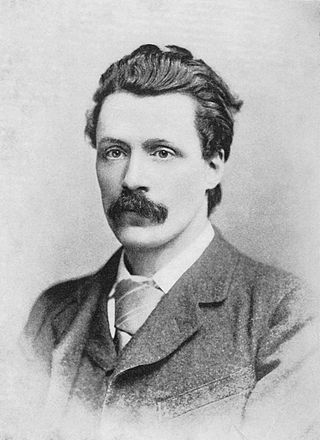
George Robert Gissing was an English novelist, who published 23 novels between 1880 and 1903. In the 1890s he was considered one of the three greatest novelists in England, and by the 1940s he had been recognised as a literary genius. Gissing's best-known works have reappeared in modern editions. They include The Nether World (1889), New Grub Street (1891) and The Odd Women (1893). He retains a small but devoted group of followers.

Trilby is a novel by George du Maurier and one of the most popular novels of its time. Published serially in Harper's New Monthly Magazine from January to August 1894, it was published in book form on 8 September 1894 and sold 200,000 copies in the United States alone. Trilby is set in the 1850s in an idyllic bohemian Paris. Though Trilby features the stories of two English artists and a Scottish artist, one of the most memorable characters is Svengali, a rogue, masterful musician and hypnotist.
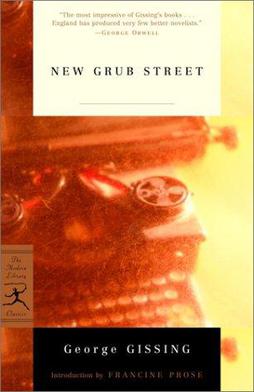
New Grub Street is a British novel by George Gissing published in 1891, which is set in the literary and journalistic circles of 1880s London. The story deals with the literary world that Gissing himself had experienced. Its title refers to the London street, Grub Street, which in the 18th century became synonymous with hack literature, although by Gissing's time, Grub Street itself no longer existed. Gissing revised and shortened the novel for a French edition of 1901.

Will Warburton: A Romance of Real Life was George Gissing's last novel. It was published in 1905, two years after Gissing's death.
The Task: A Poem, in Six Books is a poem in blank verse by William Cowper published in 1785, usually seen as his supreme achievement. Its six books are called "The Sofa", "The Timepiece", "The Garden", "The Winter Evening", "The Winter Morning Walk" and "The Winter Walk at Noon". Beginning with a mock-Miltonic passage on the origins of the sofa, it develops into a discursive meditation on the blessings of nature, the retired life and religious faith, with attacks on slavery, blood sports, fashionable frivolity, lukewarm clergy and French despotism among other things.

Born in Exile is a novel by George Gissing first published in 1892. It deals with the themes of class, religion, love and marriage. The premise of the novel is drawn from Gissing's own early life — an intellectually superior man born into a socially inferior milieu, though the story arc diverges significantly from the actuality.

The Odd Women is an 1893 novel by the English novelist George Gissing. Its themes are the role of women in society, marriage, morals and the early feminist movement.
Eve's Ransom is a novel by George Gissing, first published in 1895 as a serialisation in the Illustrated London News. It features the story of a mechanical draughtsman named Maurice Hilliard, who comes into some money, which enables him to live without working. As part of his resulting travels, he meets and falls in love with Eve Madeley, a book keeper.
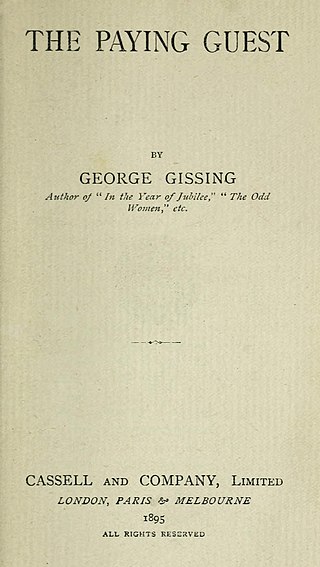
The Paying Guest is a satirical novella by George Gissing, first published in 1895 by Cassell, as part of their Pocket Library series. It recounts the experiences of the Mumfords, a middle-class family who invite a "paying guest" into their home to supplement their income. Written in an unusually comic tone compared with Gissing's earlier works, The Paying Guest was generally received well by critics. Gissing himself, however, was not satisfied with the work.
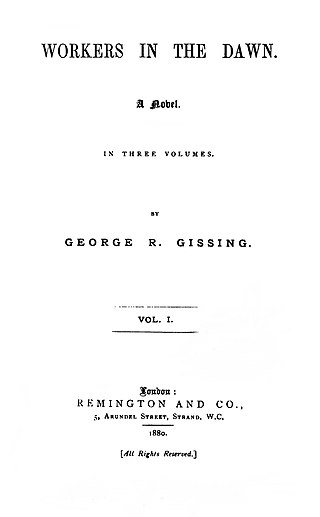
Workers in the Dawn is a novel by George Gissing, which was originally published in three volumes in 1880. It was the first of Gissing's published novels, although he had been working on another prior to this. The work focuses on the unhappy marriage of Arthur Golding, a rising artist from a poor background, and Carrie Mitchell, a prostitute. This plot was partly based on Gissing's negative experiences of marriage to his first wife. It also was designed to serve the function of political polemic, highlighting social issues that Gissing felt strongly about. Reviews of the novel generally recognised some potential in the author, but were critical of Workers in the Dawn. After reading the first known published review in the Athenaeum, Gissing was driven to describe critics as "unprincipled vagabonds".

Demos: A Story of English Socialism is a novel by the English author George Gissing. It is a story of the moral and intellectual corruption of a working-class Socialist who inherits a fortune. It was written between late 1885 and March 1886 and first published in April 1886 by Smith, Elder & Co.

David Christie Murray was an English journalist, who also wrote fiction.
The Gissing family of Great Britain included several noted writers, Olympic competitors, and teachers.

The Private Papers of Henry Ryecroft is a semi-fictional autobiographical work by George Gissing in which the author casts himself as the editor of the diary of a deceased acquaintance, selecting essays for posthumous publication. Observing "how suitable many of the reflections were to the month with which they were dated", he explains that he "hit upon the thought of dividing the little book into four chapters, named after the seasons".
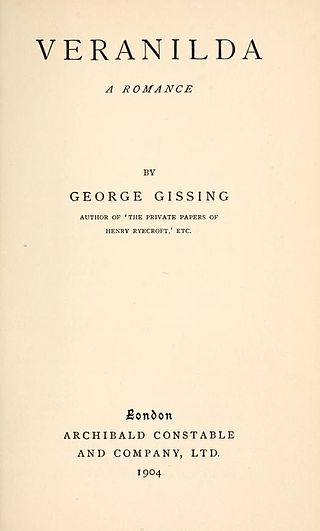
Veranilda: A Romance is a posthumous novel by English author George Gissing. The book was left incomplete at the time of Gissing's death and it was first published in 1904 by Archibald Constable and Company.

In the Year of Jubilee is the thirteenth novel by English author George Gissing. First published in 1894.

Denzil Quarrier is a novel written by the English author George Gissing, which was originally published in February 1892.
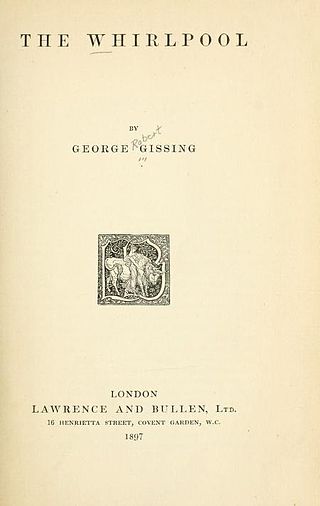
The Whirlpool is a novel by English author George Gissing, first published in 1897.

















